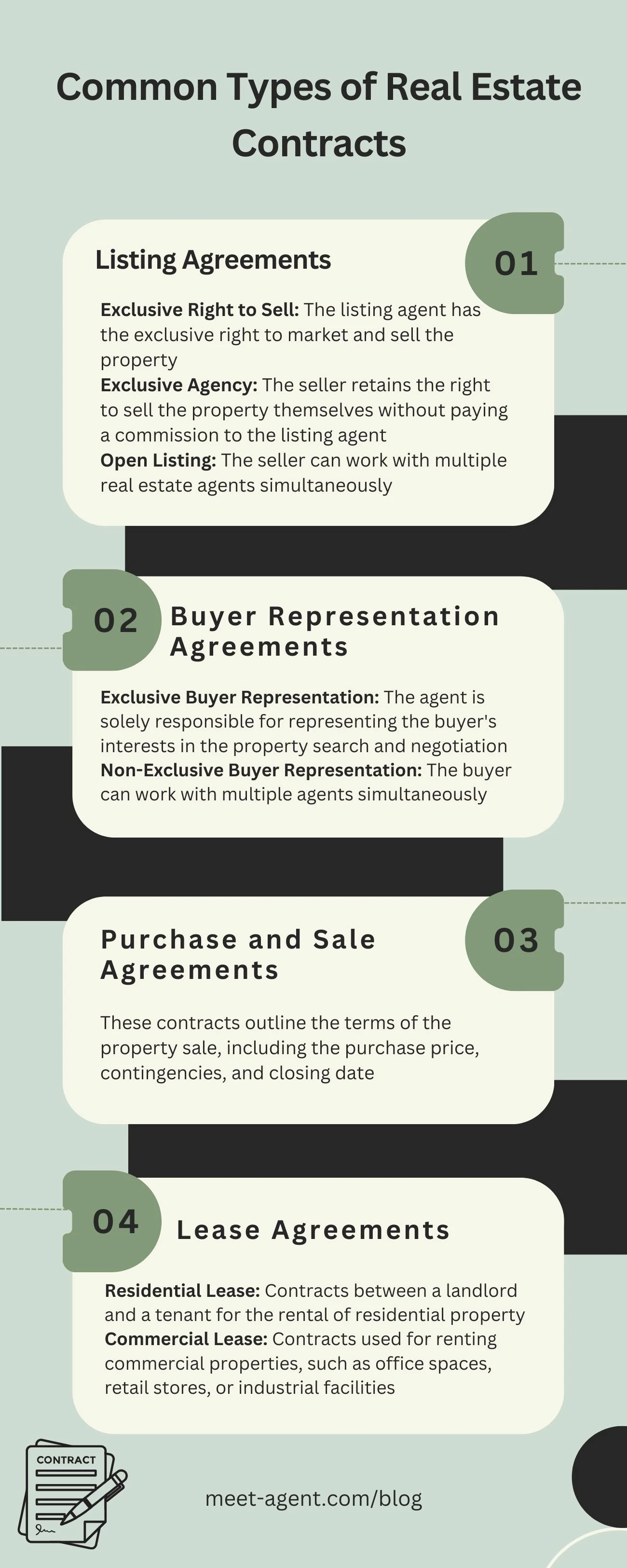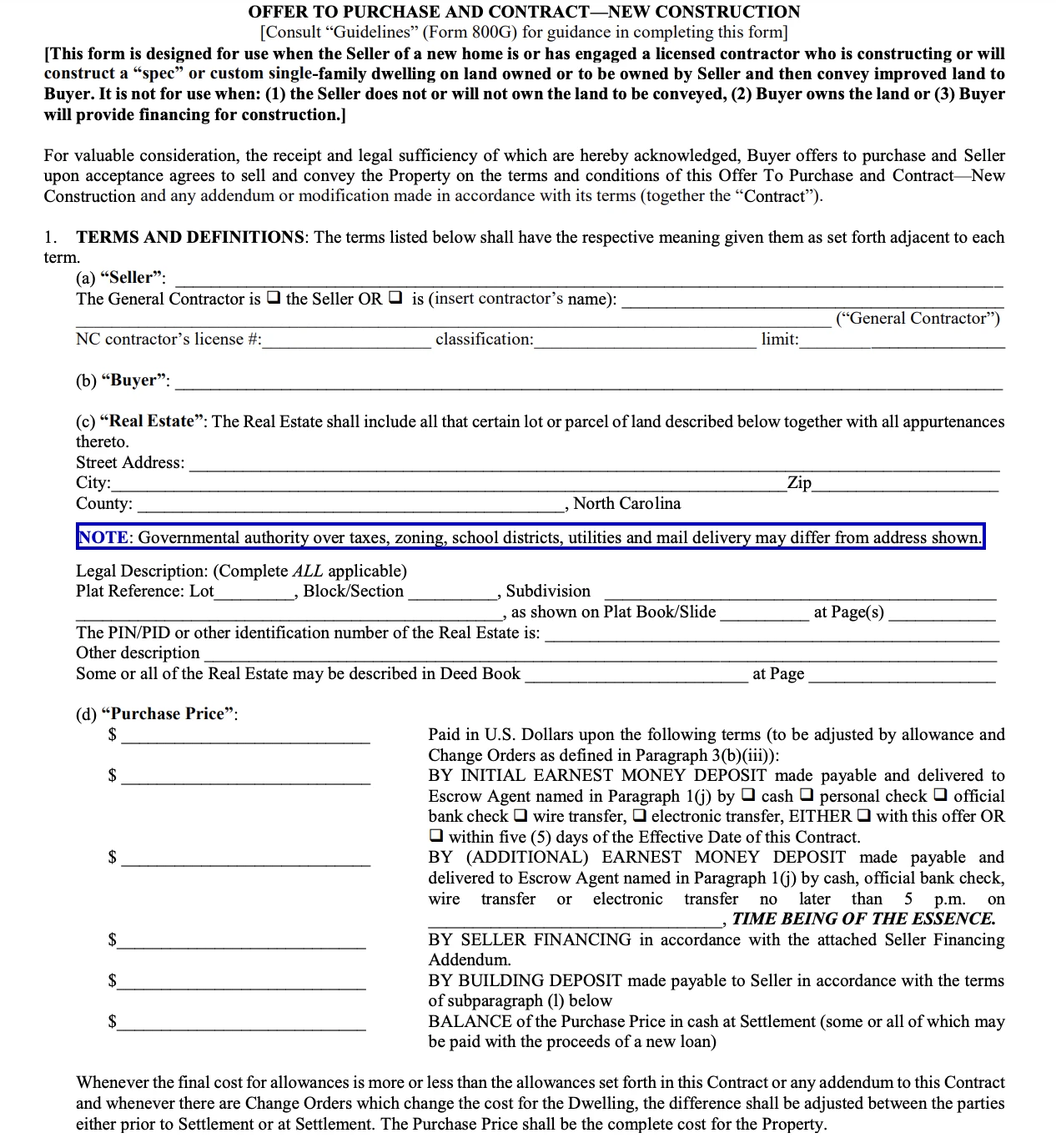Real Estate Contracts: A Comprehensive Guide for Agents
Real estate contracts form the foundation of every property transaction, playing a pivotal role in the work of real estate agents. These legally binding agreements outline the terms and conditions between buyers, sellers, and other parties involved in the buying or selling process. As an essential component of the agent's responsibilities, understanding and navigating real estate contracts is crucial for ensuring successful and smooth transactions. Mastery of real estate contracts empowers agents to protect their clients' interests, facilitate fair deals, and navigate potential legal challenges with confidence.

This comprehensive guide for real estate agents dives into the intricate world of real estate contracts, equipping them with the knowledge and tools necessary to excel in their roles. It begins with an exploration of the fundamentals, defining the purpose and importance of real estate contracts while highlighting the key elements that validate their legality. The article then delves into the various types of real estate contracts agents commonly encounter, from listing agreements to buyer representation contracts, and from purchase agreements to lease contracts. The guide proceeds to examine the critical provisions and terms that shape real estate contracts, and explore the art of negotiation and drafting in the context of real estate contracts. To ensure agents remain within the boundaries of legal compliance, the guide concludes with a thorough examination of legal considerations and disclosure requirements in real estate contracts, empowering agents to navigate the legal landscape with prudence and foresight.
Understanding the Fundamentals of Real Estate Contracts
Definition and Purpose of Real Estate Contracts
Real estate contracts are legally binding agreements that establish the terms and conditions governing property transactions between parties, typically involving buyers, sellers, and real estate professionals. These contracts serve as the blueprint for the entire transaction, outlining the rights and obligations of each party involved. The purpose of real estate contracts is to provide clarity, protection, and enforceability to all parties, ensuring that the deal is conducted in a fair and transparent manner. For instance, when a homebuyer signs a purchase agreement with a seller, the contract specifies the purchase price, financing terms, and contingencies, thereby safeguarding the interests of both parties throughout the transaction.
Real estate contracts are legally binding agreements that establish the terms and conditions governing property transactions between parties, typically involving buyers, sellers, and real estate professionals.
Essential Elements of a Valid Contract
Real estate contracts must meet specific criteria to be legally enforceable. The essential elements of a valid contract include an offer, acceptance, consideration (usually money), legal capacity of all parties involved, and a lawful purpose. Each element ensures that the contract is binding and reflects the mutual agreement between the parties. For instance, when a seller offers their property for sale, and a buyer accepts the offer with a deposit (consideration), the contract becomes legally binding upon both parties. Moreover, real estate contracts must be in writing to satisfy the Statute of Frauds in many jurisdictions, providing a tangible record of the terms agreed upon.
The essential elements of a valid contract include an offer, acceptance, consideration, legal capacity of all parties involved, and a lawful purpose.
Different Types of Real Estate Contracts
Real estate transactions involve various types of contracts tailored to specific scenarios. Listing agreements are common contracts between sellers and their listing agents, granting the agent the exclusive right to market and sell the property for a specific period. For example, an exclusive right-to-sell listing agreement allows the agent to earn a commission regardless of who brings the buyer. Buyer representation agreements, on the other hand, establish the agent's duty to represent the buyer's interests during property search and negotiation. These agreements may be exclusive or non-exclusive, depending on the scope of representation. Additionally, purchase and sale agreements, also known as sales contracts or purchase contracts, outline the terms of the property sale, including the purchase price, contingencies, and closing date. Different types of contracts cater to diverse real estate scenarios, and understanding their nuances is essential for real estate agents to deliver exceptional service to their clients.
Common Types of Real Estate Contracts

Listing Agreements
Exclusive Right to Sell: In an exclusive right-to-sell listing agreement, the seller grants the listing agent the exclusive right to market and sell the property. Regardless of who brings the buyer, the agent is entitled to a commission upon a successful sale. This type of agreement offers the most protection and commitment for the agent and is commonly used in residential real estate.
Exclusive Agency: An exclusive agency listing agreement allows the seller to retain the right to sell the property themselves without paying a commission to the listing agent. However, if the agent brings a buyer who ends up purchasing the property, the agent earns a commission. This type of agreement provides a balance of flexibility for the seller while incentivizing the agent to actively market the property.
Open Listing: An open listing agreement permits the seller to work with multiple real estate agents simultaneously. The agent who successfully procures a buyer earns the commission. This arrangement is often used by sellers who wish to test the market and have a non-exclusive relationship with agents.
Buyer Representation Agreements
Exclusive Buyer Representation: An exclusive buyer representation agreement establishes an exclusive working relationship between the buyer and their agent. The agent is solely responsible for representing the buyer's interests in the property search and negotiation. This type of agreement ensures undivided loyalty from the agent, providing the buyer with comprehensive support.
Non-Exclusive Buyer Representation: Non-exclusive buyer representation agreements allow the buyer to work with multiple agents simultaneously. The buyer is not obligated to work exclusively with any one agent and may engage multiple agents in their property search.
Purchase and Sale Agreements
Purchase and sale agreements, also known as sales contracts or purchase contracts, are crucial in real estate transactions. These contracts outline the terms of the property sale, including the purchase price, contingencies, and closing date. For example, a purchase and sale agreement for a residential property will include the agreed-upon purchase price, the down payment amount, the closing date, and any specific contingencies, such as financing and inspection.
Lease Agreements
Residential Lease: Residential lease agreements are contracts between a landlord and a tenant for the rental of residential property. These agreements specify the rental terms, such as the monthly rent amount, lease duration, security deposit, and tenant responsibilities.
Commercial Lease: Commercial lease agreements are used for renting commercial properties, such as office spaces, retail stores, or industrial facilities. These contracts differ from residential leases in their complexity and may involve additional terms related to maintenance, insurance, and lease renewals.
Understanding these common types of real estate contracts empowers real estate agents to guide their clients through various transactions with expertise and precision, ensuring smooth and successful deals for all parties involved.
Key Provisions and Terms in Real Estate Contracts
Property Description and Identification
One of the fundamental elements of a real estate contract is a detailed and accurate property description. This provision ensures that both parties are clear about the specific property being bought or sold. The property description should include the address, legal description, and any other identifying details necessary for the transaction. For instance, in a residential purchase contract, the property description would encompass the street address, city, state, and zip code, enabling precise identification of the property in question.
Price and Payment Terms
The price and payment terms section outlines the agreed-upon purchase price of the property and the payment schedule. This provision also covers the accepted forms of payment and any additional financial terms, such as earnest money deposits or down payments. For example, in a purchase and sale agreement for a commercial property, the price and payment terms would specify the total purchase price, the initial deposit amount, and any subsequent payments due at closing.

Contingencies and Conditions
Financing Contingency: A financing contingency is a crucial provision in real estate contracts that safeguards the buyer's interests. It allows the buyer to back out of the transaction if they fail to secure the necessary financing to purchase the property. This contingency sets a specific timeframe within which the buyer must obtain a mortgage approval or funding commitment. If the buyer is unable to secure financing within the stipulated period, they can terminate the contract without penalty.
Inspection Contingency: The inspection contingency gives the buyer the right to conduct a thorough inspection of the property. If the inspection reveals significant issues or defects that were not disclosed by the seller, the buyer can negotiate repairs or request a price reduction. If the parties cannot reach an agreement on the repairs or price adjustment, the buyer may choose to back out of the deal.
Appraisal Contingency: An appraisal contingency allows the buyer to withdraw from the contract if the property's appraised value falls short of the agreed-upon purchase price. This contingency is essential for ensuring that the property's value aligns with the purchase price and protects the buyer from overpaying for the property.
Closing and Possession Dates
The closing and possession dates section specifies the date on which the transaction will be finalized, and ownership of the property will transfer from the seller to the buyer. This provision also covers when the buyer will take possession of the property. For example, in a residential purchase contract, the closing and possession dates would outline the date of the closing meeting at the title company or escrow office, as well as the date when the buyer can move into the property.
Default and Termination Clauses
The default and termination clauses address the consequences and circumstances under which the contract may be terminated by either party. These clauses may outline the remedies available to the non-breaching party if one party fails to fulfill their obligations under the contract. For instance, a default clause may specify that if the buyer fails to make the agreed-upon payment on time, the seller has the right to cancel the contract and retain the earnest money deposit as compensation.
Understanding and including these key provisions and terms in real estate contracts is essential for ensuring a fair and smooth transaction process. Each provision serves to protect the interests of both parties and provides a framework for addressing potential issues that may arise during the course of the real estate transaction.
Negotiating and Drafting Real Estate Contracts
Understanding Client Needs and Goals
Effective negotiation and drafting of real estate contracts begin with a deep understanding of the client's needs and goals. As real estate agents, it is crucial to actively listen to clients and identify their specific requirements for the transaction. For instance, if a client is a first-time homebuyer looking for a property with a flexible closing timeline to align with their job relocation, understanding this preference can guide the negotiation process. By tailoring the contract terms to meet the client's unique needs, agents can build trust and enhance the overall client experience.
Strategies for Effective Negotiations
Successful negotiation skills play a pivotal role in real estate contracts. Agents must be adept at analyzing market conditions, comparable property sales, and understanding the motivations of the other party to devise effective negotiation strategies. For instance, when representing a seller, an agent may strategically position the property's attractive features to justify a higher listing price. On the other hand, when representing a buyer, an agent may leverage market data to negotiate for a lower purchase price or request seller concessions. Effective negotiations can lead to favorable outcomes for both parties, ensuring a win-win situation.
Drafting Clear and Comprehensive Contracts
Clear and comprehensive contracts are essential for avoiding potential disputes and misunderstandings during the transaction process. Real estate agents should meticulously draft contracts, ensuring that all agreed-upon terms, contingencies, and deadlines are explicitly stated. Using precise language and avoiding ambiguous terms can prevent misinterpretations and provide a solid foundation for a smooth transaction. Additionally, agents must stay updated on relevant legal requirements and industry standards to ensure their contracts align with current regulations.
By prioritizing client needs, employing effective negotiation strategies, and crafting precise contracts, real estate agents can foster successful and mutually beneficial transactions for their clients. These skills not only enhance an agent's reputation and credibility but also contribute to long-term client satisfaction and referrals, strengthening their position in the competitive real estate market.
Legal Considerations and Disclosures in Real Estate Contracts
Required Disclosures and Obligations
Real estate contracts come with a range of legal considerations and required disclosures to protect both buyers and sellers. In many jurisdictions, sellers are obligated to disclose any known defects or issues with the property that could impact its value or safety. Failure to disclose such information could lead to legal repercussions and potential lawsuits. For example, if a seller is aware of a structural issue with the property but fails to disclose it in the contract, the buyer may have grounds to take legal action after the sale is completed. Additionally, real estate agents must adhere to ethical and legal obligations, such as ensuring all parties involved in the transaction fully understand the contract's terms and implications. By upholding these responsibilities and providing accurate disclosures, agents can build trust with their clients and maintain their professional integrity.
Avoiding Common Legal Pitfalls
Real estate agents must be vigilant in avoiding common legal pitfalls that could jeopardize a transaction. This includes accurately representing the property's condition, avoiding misrepresentations, and adhering to fair housing laws to prevent discrimination. For instance, if an agent provides inaccurate information about a property's square footage or amenities, the buyer may feel misled and pursue legal action against the agent or the seller. Additionally, agents must be cautious when negotiating with multiple parties to ensure they act in the best interest of their client and avoid any conflicts of interest. By staying informed about legal requirements and potential pitfalls, real estate agents can safeguard their clients' interests and prevent costly legal disputes.
Navigating the legal aspects of real estate contracts requires diligence, attention to detail, and a comprehensive understanding of the relevant laws and regulations. By fulfilling disclosure obligations and avoiding legal pitfalls, real estate agents can foster transparency, protect their clients' interests, and establish a reputation for ethical and trustworthy conduct within the industry.
Conclusion
In conclusion, a thorough understanding of real estate contracts is essential for agents to navigate the complexities of the industry and provide exemplary service to their clients. Throughout this comprehensive guide, we have explored the fundamental aspects of real estate contracts, ranging from their definition and purpose to the various types commonly encountered in the field.
Real estate contracts serve as the backbone of every property transaction, outlining the rights and obligations of all parties involved. From listing agreements that determine a seller's representation to purchase and sale agreements that finalize a deal, each contract type has unique provisions and considerations. Key elements such as property descriptions, price terms, and contingencies play pivotal roles in ensuring a smooth and successful transaction. Additionally, we've highlighted the significance of legal obligations and disclosures to safeguard clients' interests and maintain professional integrity.
Armed with the knowledge gained from this comprehensive guide, real estate agents are empowered to excel in their roles as trusted advisors to buyers and sellers. Implementing the strategies for effective negotiations and clear contract drafting can lead to more favorable outcomes for clients. By staying updated on legal requirements and industry best practices, agents can instill confidence in their clients and build long-lasting relationships based on trust and reliability. As the real estate landscape evolves, continued education and application of this knowledge will ensure agents remain at the forefront of the industry and deliver exceptional service that exceeds client expectations.
Looking for leads?
Free real estate leads for agents. Join Meet Agent today to follow up!




